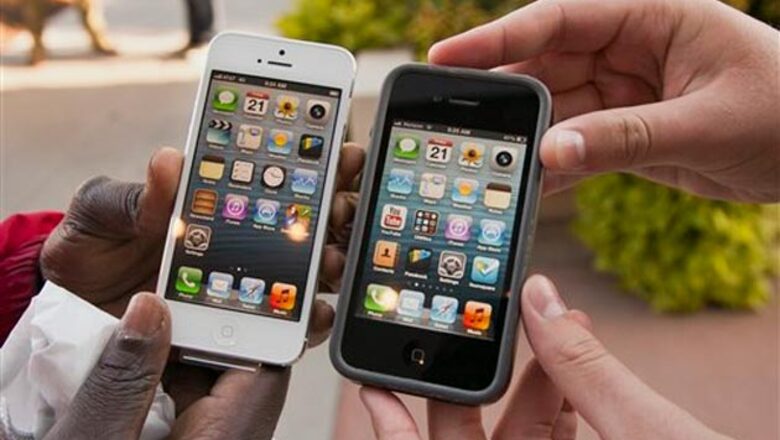
views
New York: If you run your finger over one of the joints where plastic and metal meet on the rim of the iPhone 5, you feel just the slightest hint of the seam. The materials have been machined to blend into one another with astonishing, jewel-like precision.
This is the essence of Apple: creating a product that looks and feels so good, you just know it has to be good.
The iPhone 5 lives up to its looks in the sense that it's the best iPhone yet. It's also the biggest overhaul to the line since the release of the 3G, four years ago. Compared to other high-end smartphones, however, it's more of a catch-up move.
The iPhone has a winning recipe already, and Apple's upgrades are careful and thoughtful. Beyond the beauty and thinness of it, there are no new hardware features you can't get with other phones.
For instance, the screen is bigger, but not big. It's the first time Apple is increasing the screen size of the phone, from a diagonal of 3.5 inches to one of 4 inches. The width has stayed the same, so the entire increase has come from making the screen taller.
Other smartphone makers have increased their screen sizes in the last few years, after realising that a big screen is something customers like - and something Apple had refused to provide. Samsung's flagship Galaxy S III has a 4.8-inch screen, for instance.
The taller screen means that third-party apps will be hemmed in by black bars until the developers get around to updating them for the new dimensions.
The other major upgrade in the iPhone 5 is that it now comes with the ability to connect to "LTE" networks in the US, Canada, and a few other countries. These are the latest, fastest data networks, and they'll make a huge difference, at least for Sprint and Verizon customers, who have been stuck on the relatively slow, older networks of those carriers (though Sprint customers will be hard pressed to find any LTE towers - the company has just started building out the network.) For AT&T customers, the difference will be noticeable but not as big.
When it comes to LTE, Apple is trailing the pack. The company skipped the first generation of LTE-capable chips, which went into competing phones as far back as a year and a half ago, because they were too power-hungry. Now that the chips have improved and LTE is a near-standard feature in smartphones, Apple is coming on board.
Apple is pushing the envelope on screen technology by adopting a display that eliminates one glass layer. Ahead of Apple's announcement, company watchers were betting it would use the space freed up by the new technology to increase the battery size for the benefit of LTE users, keeping the size of the phone the same.
But Apple has actually made the phone considerably thinner, while keeping the stated battery life at an impressive eight hours of LTE usage (I did not have enough time with the phone to test this claim).
This, along with obsessive attention to fit and finish, makes for an exquisitely tight, light phone that seems perfect for the hand. The iPhone 4S suddenly looks chunky in a Stalinist way, and the Galaxy S III looks cheap and plasticky.
The phone is really too pretty to cover with a case — I'd get a good insurance plan for it instead. The glass on most of the back has been replaced with matte aluminum, which will probably scratch and wear considerably, but it should be less fragile than the notoriously breakage-prone backs on the 4 and 4s.
One victim of the slimmed-down body is the old connection port. It was just too big to survive. Apple has replaced it with a much smaller port it calls "Lightning." This means the iPhone 5 won't fit into your iPod dock. Old charging cables won't work, either. You'll have to buy an exquisitely overpriced $29 adapter from Apple or wait for knock-offs.
It would have been nice, and uncharacteristic, of Apple to go with the flow and use the micro-USB port every other phone uses these days. That way, you could charge iPhones with other chargers, and vice versa. The Lightning port is better than micro-USB because it provides a deeper, more secure fit and it's reversible, you don't have to worry about whether you're trying to fit in the cable upside-down. But as the number of gadgets in the home keeps rising, standardizing on one port would have been welcome help with managing the chargers.
There's something else that now has a deeper, more secure fit: the new earbuds. These "EarPods" are completely redesigned. Instead of broad, round speakers, they have small, oval outlets that beam sound into the ear canal. The sound quality is outstanding. They can be bought separately for $29, and this time, that price tag looks modest.
The hardware updates mean that I'm still comfortable recommending the iPhone as the best phone out there. They don't break much new ground, but they support the things that really set the iPhone apart: the slick, reliable operating system and the multitude of high-quality, third-party applications. There's a reason Apple can sell two-year-old phones (like the "4") while other manufacturers retire theirs after a year or less. The iPhone phenomenon is about so much more than the phone.


















Comments
0 comment